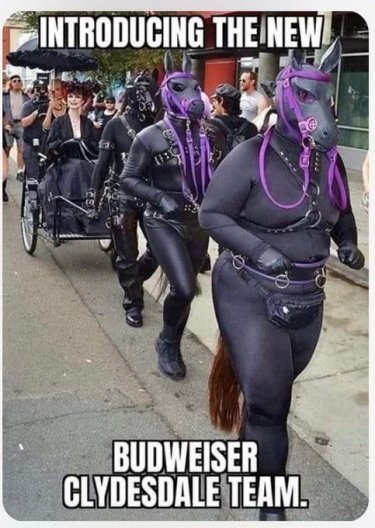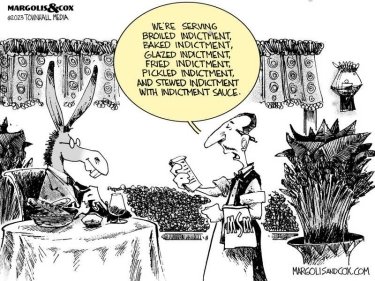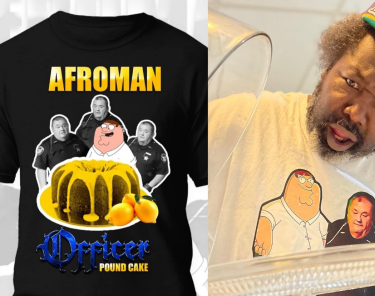There Is, of Course, An Alternative to the Peaceful Transition of Power…
Alvin Bragg, Donald Trump, Peaceful Transition of Power, Weaponized Justice System, William Otis
Bill Otis, at Ringside at the Reckoning, identifies precisely why Alvin Bragg’s fabricated Trump Indictment is such a spectacularly outrageous violation of the American political process and could very well mark a key transition point in the transition from Republic to Empire.
How many zillion column inches of anguished outcry have we seen about the January 6 Capitol protesters, Donald Trump’s egging them on (which he did, there’s no use in denying it), and the damage it all did to America’s most hallowed tradition of governance — the peaceful transfer of power from one party to the (sometimes viscerally antagonistic) opposing party? Liberals and others have wailed daily for more than two years that it was Trump’s threatening and soiling this tradition that was by far the most grievous of his numerous grievous sins as President. ..
[I strongly disagree with the omitted short paragraph. DZ]
It’s now time to ask the critical question that Alvin Bragg’s indictment raises but, oddly, has been all but absent from public discussion over the last week: What exactly has made possible the tradition of a peaceful transfer of power?
It’s one thing above everything else — the losers’ faith that the winning party won’t use the power of government to put them in jail. Last week, that faith disappeared from America.
It disappeared courtesy of a radical DA in a one-party, Trump-hating jurisdiction. No matter what happens from here on in, America won’t be the same. It will be a darker place, and it will be darker whether or not Trump paid hush money to a porn star and whether or not that can be turned into a campaign finance violation — much less into roughly three dozen felonies. Throwing away the critical foundation of the most important tradition of American governance is not, and on any sane accounting cannot be, worth it.
This is not to say that Trump or any other office holder or former office holder should be above the law. They shouldn’t, lest another of our hallowed traditions — that the law is no respecter of persons — likewise be vanquished. But no one should be below the law either, and for a prosecutor to launch the enormous power of his office against a political enemy for a crime as technical, and on a legal theory as exotic, as this, is to operate in way that any mature and realistic person would recognize as being, not law, but giddy revenge.
Julius Caesar, recognizing that he would soon be facing the same kind of cooked-up charges and weaponized justice system that Donald Trump is currently facing, simply ignored the laws and crossed the Rubicon with his legions under arms.
Who Would Hire a Tranny to Promote Bud Light Beer? She Would!
Advertising, Alissa Heinerscheid, Anheuser Busch, Bud Light, Dylan Mulvaney, Transgender Issues
Alissa Heinerscheid, Bud Light’s VP of Marketing, doubles down on her extreme woke strategy to promote the “declining” American beer brand to “young people”, while smearing her former customers as “fratty and out of touch”.
How’s that working out for you, lady? @budlight pic.twitter.com/zNYKbMnZnu
— Old Row (@OldRowOfficial)
Alissa Gordon Heinerscheid
(She/Her)
VP, Bud Light, first female to lead the largest beer brand in the industry

There are, of course, large numbers of really bright young people capable of independent critical thought at the top elite schools. Unfortunately, there are even larger numbers of Lumpen-Icy-Leaguers, tools, grade-grubbing climbing conformists, who make up the noisy Woke minority whose voices are always presented in the establishment media.
It is kind of astonishing though that major business corporations would, having interviewed someone like her, actually hire her and allow her to make such obviously disastrous policy decisions.
“Hey, guys! How about we just drop our uncool, old-time customers? Those people are dinosaurs. We need to sell beer to diverse young people like me!” Genius, sheer genius. She’ll probable go on to be hired as head of advertising for NASCAR or Copenhagen snuff!
Harvard/Yale/Princeton, Then and Now
F. Scott Fitzgerald, Harvard, Princeton, Quora, Yale
 My residential college (Berkeley) at Yale.
My residential college (Berkeley) at Yale.
The images of Yale and Princeton seem to be at least slightly different today from what they were a century ago. Harvard’s, on the other hand, seems not to have changed really all that much.
Back in 1920, F. Scott Fitzgerald, Princeton ’17, in This Side of Paradise described “The Yale Thing” this way:
“I want to go to Princeton,” said Amory. “I don’t know why, but I think of all Harvard men as sissies, like I used to be, and all Yale men as wearing big blue sweaters and smoking pipes.”
Monsignor chuckled.
“I’m one, you know.”
“Oh, you’re different. I think of Princeton as being lazy and good-looking and aristocratic, you know, like a spring day. Harvard seems sort of indoors,”
“And Yale is November, crisp and energetic,” finished Monsignor.
“That’s it.”
They slipped briskly into an intimacy from which they never recovered.
—————————
Quora is loaded to the gills with questions about elite colleges (mostly from ambitious Third World residents).
Some common themes are prestige and college character comparisons. These inquiries are commonly jejune and amount to nothing more than presumptuous expressions of adolescent fantasy on the part of people with no chance of being admitted to these kinds of schools, and they generally are simply ignored.
But every now and then the question provokes an interesting response. Somebody asked:
What type of students does each Ivy League look for?
Harry Lee responded:
Just because a school has more choices in picking students does not guarantee the wisdom of its pick. Steve Jobs would have been rejected by all Ivies today. But since the same AO has been picking students over many many years, we do see some pattern that reflects the AO’s taste in part.
I will answer this based solely on my prejudice, for what its worth. Take it at your own peril. (Don’t give me which school is not Ivy stuff – I know.)
Harvard: Model human beings with presentable stats and characters (yes, they are genuinely nice), with no evidence of glaring mental disease (see Yale and Princeton for comparison). Most balanced Ivy. The only Ivy with human mascot; all others are beasts. Earth’s answer to alien invasions. Must be, and look, strong across the board, but more importantly, must have no weakness, nothing controversial, especially on paper. Certainly a fox type, not a hedghog type. (“A fox knows many things, but a hedgehog one important thing.”) Righteous and virtuous. Downside: Naive, bookish, unresourceful, unresilient, weak mental, carrying self-congratulatory smile. Often fall preys to determined and/or scheming underdogs. Diploma likely to end up being life’s greatest achievement. Real life is very different from school. Too risk-averse to try something that may be “unworthy” of alma mater; looking respectible becomes a burden after a while. Unable to reject expectation of others. Haunted by the self-question: “What is ‘me minus Harvard’ worth?” Bullied abruptly by bosses: “Let’s test how smart a Harvard guy is.” Bullied abruptly by spouses: “[You don’t even know how to turn off the dang faucet] – tell me, did you really go to Harvard?”
Yale: Creative, Passionate Artists with ADHD. Most artistic Ivy. Possess one big thing, lack others and proud of it. Ivy with greatest number of mathematically challenged – you can still succeed in life without understanding calculus. Certainly the hedgehog type (“All I need is making one big hole”) – an outlier with a nuclear punch. Flexible, witty, resourceful, irreverant, pungent, unique. Capable of counter-intuitive, original thinking. Social and gregarious like wolves (in contrast to the tigers that come below) and carry “secret club” antic to life after college. Think they can beat nerdy Harvard any time. Think they cannot beat Princeton, but rarely think of Princeton anyway. Downside: George Bush, George (another) Bush. Can be too creative for own good. Superficial and/or scheming (Many early CIA members were Yalies). Lazy underachievers – and proud of it.
Princeton: Rigorously Trained Tripartite Aristocrats (Gentleman+Scholar+Athlete) – with OCD. Most analytic Ivy. No weakness in reality (ie, not just on paper). Most hard working among HYP. Superachievers and fierce competitors. Mathematically comfortable. Motto: Only paranoids survive. Regularly beat both Harvard and Yale in almost everything. Prefer working alone, like tigers (why collaborate when perfection is attainable as solo?). Downside: Robot. Can be too perfect for own good. Serious, ambitious, studious, logical, wicked smart. Brutally efficient like Amazon dot com, lacking idealistic, romantic, human touch. …
Way too complimentary to Princeton, of course. (You can tell that Harry Lee went there.) Yale beats Princeton all the time.
Rimsky-Korsakov: Russian Easter Overture
Classical Music, Easter, Nicolai Rimsky-Korsakov
Long-Delayed Robert Johnson Bio Published This Tuesday
Blues, Book Reviews, New Books, Robert Johnson, The Honest Broker
Ted Gioia has big news for Blues fans.
A scandal is taking place in American music this week. And it’s all about a book written 50 years ago—and finally published on Tuesday.
The release of this work has set off arguments that, I suspect, will continue for decades to come.
The book is the long awaited biography of blues legend Robert Johnson by the late Robert ‘Mack’ McCormick (1930-2015). Ever since it was announced a half century ago, this work has been eagerly anticipated by blues fans and music scholars—who hoped it would solve all the mysteries surrounding the most enigmatic figure in twentieth century American music.
Robert Johnson (1911-1938) profoundly influenced later generations of blues, rock, and folk performers—impacting everybody from Bob Dylan to the Rolling Stones. But what little we knew about his own life was more legend than reality. We heard crazy stories about him selling his soul to the devil, or showing up in unlikely cities under assumed names, or finally getting poisoned by a jealous husband who literally got away with murder in the racist South.
But it was hard to know what was true and what merely rumor or conjecture—until McCormick started making lengthy field trips into Mississippi, Arkansas, Louisiana, and elsewhere, going anywhere or everywhere even a speck of information might be found. While others speculated about Robert Johnson, McCormick was determined to uncover the truth—at whatever the cost.
He did most of this work in the 1960s and early 1970s—starting at a time when professors and career musicologists had little interest in undertaking this kind of laborious research into the origins of the Delta blues. The people doing the work were mostly blues fans like McCormick, and there weren’t many of them. But he was on a mission—almost like those ludicrous Blues Brothers in the movie of the same name—and through sheer bloody persistence eventually tracked down numerous people who knew the legendary musician back in the 1920s and 1930s.
By the time Mack was done, he had collected a whole archive of information from musicians, family, friends, and more than a dozen people who had witnessed or known of that fateful night when the famous guitarist stood up at his last gig, and announced “I’ve been poisoned”—and then fell to the ground.
McCormick began work on his definitive book, which he called Biography of a Phantom. It was a suitable name—because Robert Johnson was a phantom to almost everybody except McCormick himself, who had finally put together all the pieces of an amazing life story.
But the book didn’t appear in the 1970s, despite the author’s grand claims. Nor did it get published in the 1980s or 1990s or at any point in McCormick’s lifetime.
I never thought this book was show up my shelf—but here it is.Finally, after the author’s death, his huge personal archive—known as “The Monster” because of its massive size—got acquired by the Smithsonian. This stash, which had previously filled the nooks and crannies of McCormick’s Houston home, included recordings, photographs, field notes, and various manuscripts, including different versions of the unpublished Robert Johnson bio.
In the aftermath, the decision was made to publish an early draft of the manuscript. And when it came out on Tuesday, all hell broke loose—at least in the world of blues research and American music history.
—————-
Good Mockery
"Lemon Pound Cake", Afroman, Satire, War on Drugs
From the legal substack Serious Trouble:
[T]he big story of the week.
I don’t think there’s been any week when we got so many emails from listeners asking us to address a story in the news as we got from you this week asking us to talk about Afroman. Yes, Afroman, famous for the 2000 hit single “Because I Got High.”
If you have not seen the recent news about Afroman, here’s the short version: Adams County, Ohio police raided his home last year, looking for evidence of drug trafficking and kidnapping. They apparently didn’t find anything related to that, and they didn’t bring any charges. But Afroman took video footage of the raid — some from his security cameras, some that his ex-wife shot on her phone — and turned it into creative content.
For example, [above] is the music video for his new song called “Lemon Pound Cake.” It’s about one of the more rotund officers who raided Afroman’s home, and a tempting lemon pound cake sitting on Afroman’s kitchen counter that seemed to distract him from his official duties. The music video contains quite a bit of that video footage:
This and other raid-related songs have racked up millions of views on platforms like YouTube and TikTok.
Oh, and Afroman also made t-shirts with the cop’s face on them:
A post shared by O.G. Afroman (@ogafroman)
Now, the cops are suing — not for defamation, but for misappropriating their likenesses for commercial purposes. They say you’re not allowed to take video of police officers who raid your house and turn it into songs and merch you make money off.Is that right? We discuss how the First Amendment interacts with law restricting how you can use other people’s likenesses commercially. And we talk about the Streisand Effect: won’t the added publicity from the litigation only worsen a key problem the officers raise in their lawsuit, that is, that people keep making fun of them while they try to do their jobs?
Drug Prohibition is stupid. So stupid that even I find myself on the side of Afroman and against the police.










